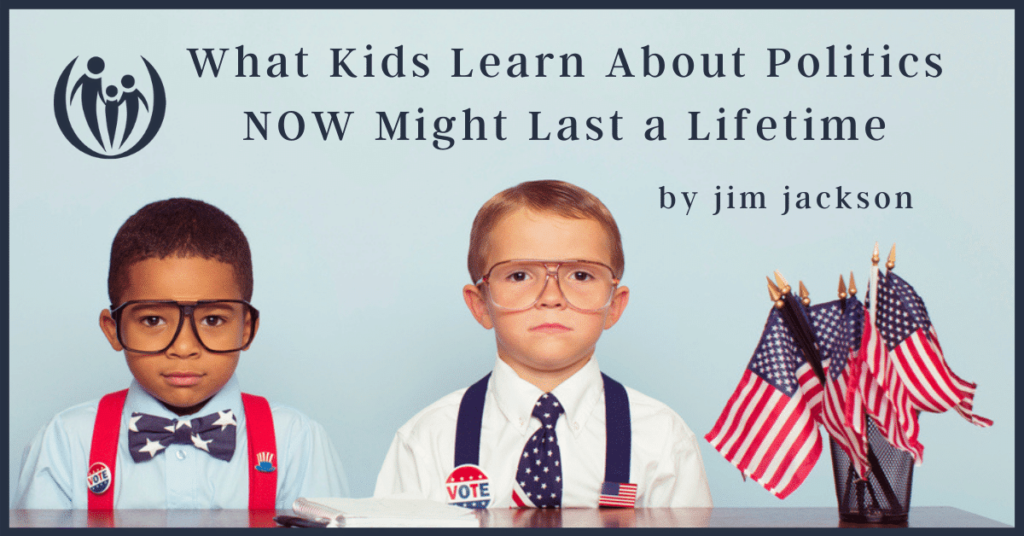
What Kids Learn About Politics NOW Might Last a Lifetime

The debates rage on. The signs are everywhere. The TV ads are frequent and dramatic and often say terrible things about a person we don’t even know. With pre-election hype at a fever pitch in the United States, it is easy to get worked up about (and fed up with) politics! But…what will your kids learn about politics this year? And how might we explain politics to a child in a way that is easy to understand and won’t bore them?
Will our kids learn about the powerful notion that, as Christians, we are to be a light of hope that points to a glorious eternal Kingdom? If only there was an online course out there called “Politics for Kids 101”!
We know how important it is to be an informed voter. That said, it’s also vitally important to make sure that kids understand the politics of respect in your home. However, it’s really difficult to teach your kids about politics as Christians if our homes are not models of Christ-centered relationships.
Once you have a solid biblical foundation and example of politics within your home, it is much easier for kids to learn how to engage meaningfully in the political world outside your home.
Jeff’s Story: What political beliefs are you teaching inside your home?
As candidates push their political agendas and make campaign promises of policy goals for the years to come, take a moment to reflect on the “politics” in your family. It’s time to ask yourself, “What goals do I have for raising my children?” It is important to consider not only what “policies” will guide your family in the years to come but also how you will teach them to your children.
Jeff was a parent who told me that the politics (the rules and expectations) in his home were clearly designed to help his children learn respect, responsibility, and faith. When asked how he thought his children knew these policies, he responded simply by saying, “They’re written down, and I speak with my children about them all the time.”
What are our kids learning about respect from us?
It is a good thing to write our rules and discuss them with our children on a consistent basis. But the values our children embrace at a heart level are primarily based not on what we tell them, but on what they experience from us.
Just like attack ads that highlight the hypocrisy of candidates who promise one thing and do another, our kids notice when our words and actions do not line up. When Jeff explained to me that one of his household policies was respect, I asked him, “Other than what you’ve told your children and written down about respect, how do you show them what respect looks like?”
Jeff is an honest man. He thought for a moment and then said, “Well, I guess what I say to my children about respect and the way they see me act are sometimes two totally different things.”
After more thought about this, Jeff was able to admit, “When my children are disrespectful, I lose patience with them. I quickly become stern and often yell. I take away toys that have nothing to do with their disrespect. And you know, I gotta confess that even the way I treat my wife in front of my children can be pretty disrespectful. The truth is, I’m not very respectful a lot of the time. So, based on my behavior, I guess our real policy is that disrespect is the main way to get things done. No wonder my kids yell at each other so much!”
Do we follow our own rules for respect in our home?
If this story sounds oddly familiar, you are not alone. Most of us struggle to consistently act according to the rules and expectations we set for our children. It is a normal and natural part of the human struggle with ego, selfishness, and pride, what the Bible calls sin. As a result, there are numerous unwritten policies in each of our lives and in each of our homes that may not be consistent with what we have written down or what we say. The way we handle this discrepancy is yet another unwritten policy we set.
Based on our brief conversation, Jeff decided to make a policy change. He confessed to his children and wife how thoughtless he had been and asked for forgiveness and patience in his new efforts to rewrite the household policy about respect. He wanted to rewrite it not just with a pencil, or even with his lips, but also with his behavior.
Do we really need to help our kids learn about politics?
As polarized as the country is right now, it can be tricky to broach the subject of politics. And it’s easy to avoid talking about politics with your kids. You might be so tired and burned out with what is going on around you that the last thing you want to do is try to explain it all to your kids!
But our kids often notice a lot more than we think they do, and they may ask questions. We need to figure out how to teach our kids about politics in a constructive way so that when the questions come, we are ready.

Keeping your own anxiety about politics out of the discussion
If we want our kids to learn about politics and engage thoughtfully about what’s happening in politics outside our home, we can only control what happens inside our home. And with us. This means being self-aware. It means dropping our big judgments and guarding our kids against our own anxiety. Here are some ideas to help you ask, “What’s going on in me?” regarding politics:
- How do you talk about politics?
- Do you catastrophize? (“If this candidate wins, I’m moving to Timbuktu!” “If that candidate wins, America is going to Hell in a handbasket!”)
- OR, do you respectfully discuss what bothers you and what your hopes are for the future?
- Do you demonstrate empathy for people who come to different conclusions than yourself?
- How do you incorporate “my kingdom is not of this world” theology into your thinking and conversations?
Then remember: Catastrophic thinking and inflammatory language are anxiety-inducing to kids! Moreover, it does nothing toward your goal of teaching your kids to trust God. It teaches them, instead, that whoever is in these political positions of power has the ultimate say on our future.
And we know that’s not true.
Putting politics and political leaders back in their place
It’s important to put politics and political leaders back in their place. Help children understand, yes, these leaders have influence, but they also have limitations. These leaders are not our God. And no matter who wins, we live under the authority of Jesus Christ, and that’s where our allegiances lie.
If candidate X wins, maybe you’ll be happy because it seems s/he is moving in a direction you like. But if candidate Y wins, God is still sovereign, and God has wonderful plans for you and your family.
Children need this message.
These leaders are not our God. And no matter who wins, we live under the authority of Jesus Christ, and that’s where our allegiances lie.
As your children get older and more aware, they may come to different political conclusions than your own. That’s natural and can even be good. It means they’re thinking on their own and fashioning their individual identity. If this creates stress for you, then it may help to look more deeply at Jesus’ teaching that His kingdom is not of this world.
Focus your conversations about differences on this eternal truth. Try to refrain from asking, “How could you possibly believe this?” but instead, “Do you feel like your beliefs reflect Jesus’ teaching or values?” Don’t argue, which just deepens disconnection, but find ways to agree on what matters (compassion for others, care for the poor, care for life at all stages, etc…) And keep connecting.
Focus on the ultimate goal: To have kids thoughtfully engage their faith as they become more aware. We want the next generation to be excited and expectant, not anxious, about what God is doing in the world around them.
Blessings as you navigate the role of politics in your family. It can be hard to lead your family with grace when it seems we are surrounded by a world that often lacks grace and respect. We count it a privilege to journey alongside you!
What are your parenting strengths?
You’ve got them. Knowing your strengths will help you become the best parent you can be. Knowing your parenting challenges is useful information too. Take our FREE ASSESSMENT.





